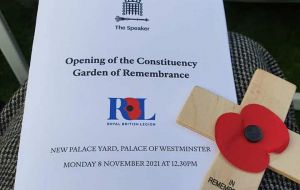MercoPress. South Atlantic News Agency
Falklands' Representative marks century of Remembrance with Speaker of Commons
 Falklands Representative Richard Hyslop at the Constituency Garden of Remembrance
Falklands Representative Richard Hyslop at the Constituency Garden of Remembrance  “For 100 years the Royal British Legion has supported those who have served with the Armed Forces community and led the nation in Remembrance”
“For 100 years the Royal British Legion has supported those who have served with the Armed Forces community and led the nation in Remembrance” The Falkland Islands Representative, Richard Hyslop, joined the Speaker of the UK House of Commons at the planting of the first-ever ‘Constituency Garden of Remembrance’ in London.
When complete, the garden will contain a Remembrance stake representing each of the 650 UK Parliamentary constituencies, the 54-member countries of the Commonwealth, and the 14 British Overseas Territories.
The House of Commons Speaker, Sir Lindsay Hoyle, said he hoped the temporary garden - devised to mark 100 years of Remembrance as we know it - ‘would be a fitting reminder of the sacrifices made by constituents from all UK Constituencies, Commonwealth countries, and British Overseas Territories’.
At an inaugural ceremony in New Palace Yard, the Speaker led the planting of Remembrance stakes with a message of gratitude to service personnel from his Chorley constituency.
Richard Hyslop followed, planting his tribute from the Falkland Islands, along with British MPs, Ministers and representatives from the Commonwealth and other British Overseas Territories who attended the service.
Sir Lindsay said he hoped by Remembrance Day on 11 November, the garden would boast more than 700 tributes, each bearing a handwritten message of thanks.
‘I am so proud that we have created a garden to mark 100 years of Remembrance as we know it together with the Royal British Legion - who do so much to provide lifelong support to serving and ex-serving personnel and their families,’ he said.‘ I hope this event will show our admiration for the Armed Forces across the Commonwealth and overseas territories and form part of our annual Remembrance activities here in Parliament.’
Richard Hyslop said: ‘This new initiative from the House of Commons Speaker is a welcome addition to the UK’s Remembrance period, and it is wholly appropriate that the contribution of the Overseas Territories is also recognised. The Falkland Islands made a significant contribution to both World Wars, with 22 Islanders giving their lives in the First World War and 24 in the Second World War. At this time of year, we also remember the 255 members of the UK Armed Forces who died liberating the Falkland Islands in 1982, and the three Islanders who were killed during the War; their families, the veterans, and all those who still bear the scars of that conflict to this day.’
Philippa Rawlinson, Remembrance Lead for the Royal British Legion, said: ‘Throughout history, the British Armed Forces have defended freedom and democracy and the RBL welcomes the creation of the new Constituency Garden of Remembrance so MPs can remember their service and sacrifice.
‘For 100 years the Royal British Legion has supported those who have served with the Armed Forces community and led the nation in Remembrance.
‘Today, we continue to unite people of different faiths, cultures, and backgrounds, to remember those who have served with the Armed Forces community from Britain and the Commonwealth, both past and present.’
The first Remembrance Day was held on 11 November 1921, following a campaign led by Earl Haig, Commander-in-Chief of the Army during the First World War, and founder of the British Legion.
This followed the unveiling of the Cenotaph in Whitehall by King George V on 11 November 1920 and the decision to adopt the poppy as a symbol of remembrance.




Top Comments
Disclaimer & comment rulesCommenting for this story is now closed.
If you have a Facebook account, become a fan and comment on our Facebook Page!